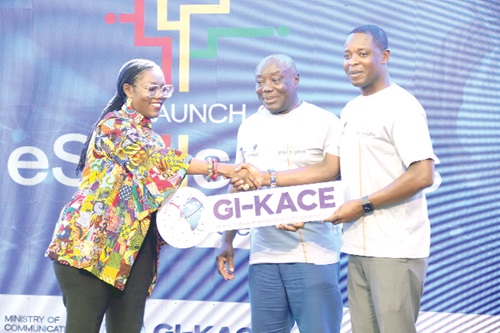
Initiative to train youth in digital literacy for employment launched
The Ministry of Communications and Digitalisation has launched an initiative to equip the youth with digital literacy and technology skills to make them competitive within the global economy and tackle youth unemployment in the country.
Dubbed “eSkills for Jobs”, it will be organised in phases and implemented through selected institutions in the Greater Accra, Ashanti, Central, Volta, Bono, Northern, Upper East, Western North, Eastern and Bono East regions.
The initiative is spearheaded by the Ghana-India Kofi Annan Centre of Excellence in ICT (GI-KACE), which will train over 5,000 participants per session in web technology, data analytics, graphic design, artificial intelligence, cyber security and digital marketing, among others.
It also centres on equipping marginalised groups in society to enable them to contribute their quota to national development.
Digital economy
Speaking at the launch in Accra yesterday, the Minister of Communications and Digitalisation, Ursula Owusu-Ekuful, reiterated the significance of creating a vibrant digital economy if the nation was to achieve its socio-economic development agenda.
In that regard, she said, the government was committed to empowering the youth with digital literacy by equipping them with technology skills that would make them more competitive within the global economy.
“That's the way the world is going and so everyone who really wants to accelerate economic growth cannot do so without focusing on digitalisation. That's exactly what we've been doing for the past eight years. So, we know the economic potential of a digitally connected society,” Mrs Owusu-Ekuful said.
The minister highlighted the numerous digital sector policies the government had implemented over the years and urged the youth to leverage the programme to enhance their employability because today’s world was technology-driven.
Mrs Owusu-Ekuful said that was because they could tap into very well-paying digital jobs that were available globally by using the platforms that were available and working either virtually or in-person.
Inclusion
The Director-General (DG) of GI-KACE, Dr Collins Yeboah-Afari, described the initiative as a “transformative” programme with the aim to foster digital empowerment and advance economic inclusion.
He said it was also a reflection of the centre’s dedication not only to train the youth, but to shape a future where digital opportunities were accessible to all Ghanaians, irrespective of their backgrounds.
Dr Yeboah-Afari added that through the programme, the centre aimed to build a workforce capable of driving the country’s digital transformation and ensuring the nation's place in the global economy.
He also noted that the initiative seamlessly aligned with the government’s mission to integrate information and communications technology (ICT) across all sectors of the economy, particularly through the Ghana Digital Acceleration Project (GDAP).
“Our goal here is to embed a culture of excellence within our youth, informed by statistics that underscore the agency of digital literacy. We understand that 71 per cent of online adults use social media, two billion people lack access to digital technologies, and an astounding 90 per cent of future jobs will demand some form of digital literacy,” he pointed out.
Dr Yeboah-Afari also emphasised that a central goal of the programme was to bridge the digital skills gap, particularly for women and persons with disabilities who would be able to assess and benefit from digital technologies.
He said through tailored training approaches, GI-KACE was committed to empowering the groups by providing them with skills and opportunities they needed to become active participants in the workforce and contribute to national development.
